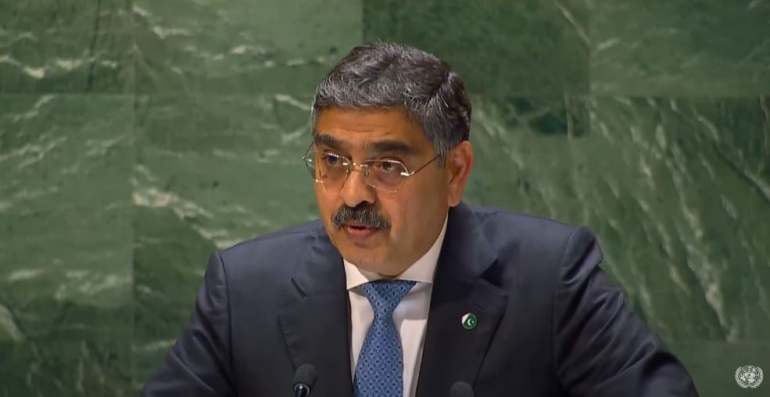Caretaker Prime Minister Anwaar-ul-Haq Kakar made his debut address to the United Nations General Assembly (UNGA) during its 78th session in New York on Friday urging global powers to play a pivotal role in persuading India to accept Pakistan’s proposal for mutual restraint on arms race for cultivating a peaceful environment in the region.
PM Kakar highlighted Pakistan’s commitment to building peaceful relations with all its neighbors, including India, underlining that peace was crucial for development.
He noted that Pakistan was situated in one of the least economically integrated regions globally, emphasizing the need for peaceful and productive relationships with neighboring countries.
The premier stressed the significance of United Nations resolutions in resolving the Kashmir issue, which remained a key factor in achieving peace between the two nuclear-armed nations.
He pointed out that the issue of Indian Illegally Occupied Jammu and Kashmir (IIOJK) was among the oldest items on the UN Security Council’s agenda.
PM Kakar criticized India for its consistent avoidance of implementing the resolutions related to the dispute.
He further emphasized that these resolutions advocated for the final determination of the disputed Himalayan territory by its people through a UN-supervised plebiscite.
PM Kakar called upon the United Nations Security Council (UNSC) to ensure the implementation of its resolutions on Kashmir.
He also urged the global action against terrorism, with a particular emphasis on “Hindutva extremists.”
His remarks also highlighted the need to address the root causes of terrorism, promote global cooperation, and address issues like climate change.
PM Kakar proposed the creation of a committee within the General Assembly to oversee the balanced implementation of the global counter-terrorism strategy.
PM Kakar described the current global situation as a “tense and pivotal moment in history.”
He pointed to the Russia-Ukraine conflict and the emergence of both old and new military and political blocs, emphasizing that geopolitics should not overshadow the importance of geoeconomics.
Kakar stressed the urgency of global cooperation to address pressing issues, cautioning against the return of a Cold War mentality.
The prime minister highlighted the grim economic prospects facing the world, citing slow global growth, the potential for a recession due to high interest rates, and the compounding effects of COVID-19, conflict, and climate change on developing nations.
Kakar called for action to fulfill commitments made during the recent climate summit, including the redirection of unused special drawing rights for development and the resolution of debt problems in 59 debt-distressed countries.
PM Kakar painted a stark picture of the climate’s impact on Pakistan, highlighting the devastating floods that submerged one-third of the country, resulting in loss of life, displacement of millions, and extensive damage to infrastructure.
PM Kakar highlighted the significance of peace in Afghanistan for Pakistan and advocated for humanitarian assistance, economic revival, and connectivity projects in the region.
He condemned cross-border terrorist attacks against Pakistan by various groups operating from Afghanistan, calling for Kabul’s support to prevent such attacks while reaffirming Pakistan’s commitment to countering terrorism.
Kakar emphasized the need to celebrate diversity and mutual respect while condemning extremism, hatred, and religious intolerance, including Islamophobia.
He cited the negative profiling of Muslims and recent incidents, such as the burning of the Holy Quran, as manifestations of this issue.



